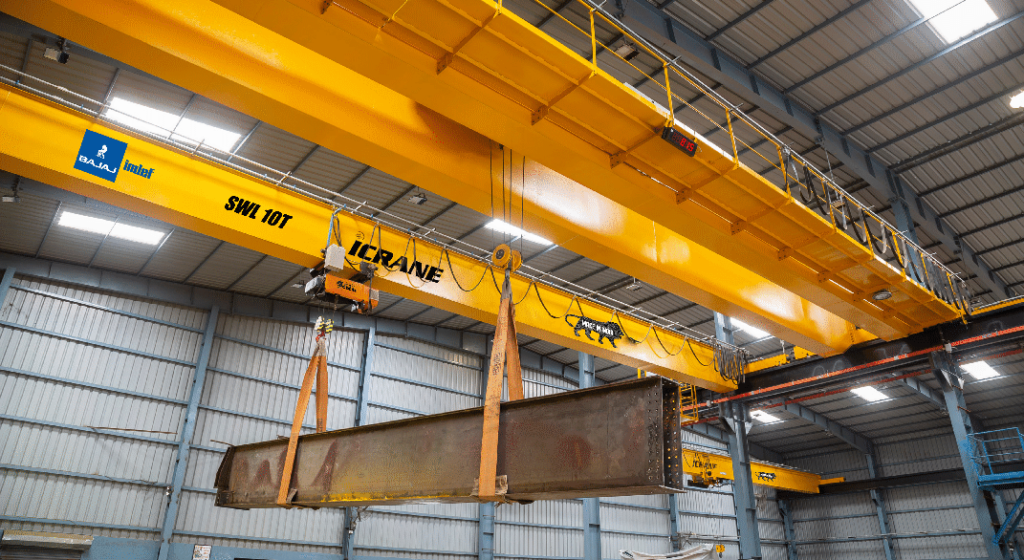Bajaj Indef: Driving the Next Wave of Lifting Excellence

As India steers into a new era of infrastructure, automation, and global competitiveness, material handling equipment is no longer just an operational requirement—it is a strategic advantage. At the forefront of this evolution stands Indef Manufacturing Limited (IML), a Bajaj Group company, sharpening its focus on crane technology, digital integration, and sector-specific engineering. In this exclusive conversation, the Managing Director of IML shares insights into the company’s redefined crane strategy post-demerger, its response to Industry 4.0, and the critical investments being made to lead India’s lifting transformation.
How has Bajaj Indef reshaped its crane strategy after the demerger, and what role do you envision in India’s industrial growth?
Bajaj Indef has long been a leader in India’s hoist market, offering unmatched value to both customers and distributor partners. Over the past decade, we’ve extended this strength to the factory cranes segment as well—ensuring customers can now rely on a single partner for both their hoist and crane requirements.
The demerger marks a strategic milestone in this journey. It has allowed us to focus entirely on becoming the winning collaborator for India’s material handling needs. As a standalone entity, IML is now agile and growth-focused, giving us room to pursue strategic collaborations, M&As, and even expansion beyond India’s borders. For investors, we offer a clear opportunity to back a specialised, future-facing company.
We’re particularly optimistic about the direction India is taking—rapid infra-structure growth, industrial expansion, and the increasing importance of automation all present a massive opportunity for trusted partners like us to step in and deliver.

How are you adopting IoT, predictive maintenance, and other digital tools to future-proof crane solutions?
This is undoubtedly one of the most exciting developments in manufacturing today. From preventive maintenance and load tracking to safety monitoring and asset health diagnostics—emerging technologies are redefining how cranes operate and how customers manage them.
We’re actively exploring the full range of possibilities. Our roadmap includes exploring all these opportunities, and success would largely depend on labour costs and productivity and the value offered to the customers.
However, we believe digital solutions must also be economically viable. If advanced technologies remain expensive and inaccessible, only a few players will benefit. Our approach is to make automation useful, affordable, and widely accessible. We’re committed to embedding technology into our products, systems, and service frameworks—so customers across the board can future-proof their operations.
What steps are you taking to ensure energy-efficient, eco-conscious crane production?
Sustainability is more than a compliance requirement—it is a core principle of the Bajaj. At Bajaj Indef, we’re actively building an ecosystem that reflects this mindset. We’ve taken significant steps to move away from traditional materials like wood and plastic in our packaging. Today, many of our chain pulley blocks and trolleys are packaged using metal or carton-based alternatives, reducing environmental impact.
Beyond packaging, we are evaluating the entire supply chain for sustainable practices. Internally, we’re also investing in plantation initiatives and driving inclusive growth programs. Our long-term goal is to embed sustainability not just in products, but in how we build, source, and deliver.
How do we cater to industry-specific needs (e.g., cement, steel, automotive) while prioritizing safety and workforce training?
We firmly believe that one-size-fits-all doesn’t work in material handling. Different industries demand different engineering philosophies, and we’ve structured our offerings to reflect that. Every crane or hoist system we design is customised to meet the exact application requirements of that industry.
Take our recent launch, ‘Glacier’, for instance—a food-grade hoist system developed for the pharmaceutical and F&B sectors. For the oil & gas sector, we offer spark-proof solutions. In cement and steel, our high-lift hoists and cranes are built to withstand extreme operational demands. Many of our products come with built-in safety devices like load cells, laser projection lights, and angular lifting alarms.
Operator safety is equally important. We conduct training sessions and partner with clients to ensure their teams are equipped to handle our systems with confidence and efficiency.
How is Bajaj Indef boosting its R&D and supply chain for crane reliability, service, and innovation?
Our supply chain is one of our biggest strengths. We’ve built long-standing partnerships with our suppliers and continue to invest in their capabilities-whether it’s infrastructure upgrades, quality control systems, or delivery mechanisms. We believe in growing together, and that philosophy reflects in our vendor relationships.
On the R&D front, we take a market-driven approach. Our sales, marketing, and ABP teams serve as our eyes and ears, capturing evolving customer demands and on-ground challenges. These insights feed directly into product development. Our innovation engine is fueled not just by global trends, but also by real feedback from our users, partners, and technical teams. This keeps our cranes not only reliable but also relevant.
Bajaj Indef
Web : www.indef.com


